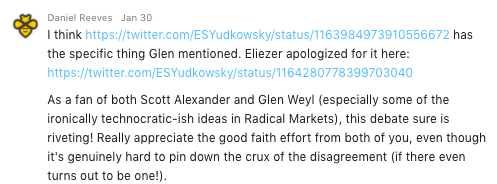The best thing I've read about Glen Weyl and Scott Alexander's back and forth was this *excellent* critique of Weyl from Devin Kalish, someone who likes both him and Scott, who I'd previously never heard of and I think should be better known:
https://www.thinkingmuchbetter.com/main/weyl-vs-the-rationalists/?fbclid=IwAR0L-rtspo3ypcn9cqyENujXY3TuQl1C8CACemaqE3bjG3kOf6SYoSKb254
https://www.thinkingmuchbetter.com/main/weyl-vs-the-rationalists/?fbclid=IwAR0L-rtspo3ypcn9cqyENujXY3TuQl1C8CACemaqE3bjG3kOf6SYoSKb254
The second best thing was @nostalgebraist clarifying how Scott had missed one of the central things Weyl cares about: fidelity versus legibility, and how far that argument can take Weyl. Scott also really appreciated the clarification. https://nostalgebraist.tumblr.com/post/641769028753522688/on-weyls-why-i-am-not-a-technocrat
And the third best thing was @dreev making me feel like less of an idiot for not being able to 100% figure out what the argument was about
Glen Weyl tweeted the first post and appreciated the critique, so it really does manage to be fair and thoughtful.
Also a good thread here reminding us to think on the margin when we're thinking about tradeoffs (if indeed thinking of technocracy and non-technocracy as trading off against each other is the right model!) https://twitter.com/RichardMCNgo/status/1361322681426202625
Which reminds me of my original position on Weyl's list of technocratic disasters (though, see the first link for how they don't really match the description): how do we figure out whether on net the generator of these bad things is bad? How much good has technocracy done?

 Read on Twitter
Read on Twitter


